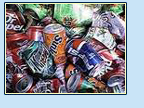
Glass

Glass never wears out and can be recycled forever, saving resources. The main glass recyclable products are:
- Beverage containers
- Food jars
All glass comes in one of three different colors: clear, green and brown. Always sort your glass products by color.
Light bulbs, dishes, mirrors, ceramics and window glass can not be recycled.
Cardboard

There are two types of recyclable cardboard, corrugated and paperboard. Corrugated is usually brown, double-layered, and a heavier weight cardboard; it is, typically, used for shipping and packaging. Paperboard is thinner and, normally, contains a single layer of cardboard; it is often used for cereal boxes, soda cartons, cups, plates, and gift boxes.
Cardboard should be flattened and stacked. Large and oversize cardboard pieces should be cut into a manageable size.
Newspaper

The entire newspaper, including inserts, is acceptable; except for things like plastic, product samples and rubber bands.
Mixed Paper
Mixed paper is all types of paper not specifically mentioned elsewhere, from magazines to packaging. The paper must still be clean, dry, and free of food, most plastic, wax, and other contamination. Staples are OK.
Aluminum and Steel Cans and Foil

Steel (or tin) and aluminum are easy to recognize.
It is not necessary to remove labels for recycling.
Aerosol cans are not permitted.
Plastic

#1: Polyethylene Terephthalate (PETE), includes soda and water bottles, medicine containers, peanut butter jars. and many other common product containers.
#2: High-density Polyethylene (HDPE) plastics include heavier containers used for laundry detergents and bleaches, milk, shampoo and motor oil.
#3: Polyvinyl Chloride (PVC), commonly used in plastic pipes, shower curtains, medical tubing, and water bottles.
Construction & Demolition Debris
We accept and recycle virtually all non-hazardous building materials that are generated from any size construction or demolition job site, residential or commercial, hauling this debris to markets.
Common Construction & Demolition materials (C&D) include lumber, drywall, metals, masonry (brick, concrete, etc.), carpet, plastic, pipe, and rocks.
Metal
Almost all aluminum and steel products are accepted and can be recycled repeatedly. Some of the more common recyclable products includes: scrap metal, appliances, auto parts, window frames, doors, building and bridge structures.
Yard Waste
Yard waste includes brush, tree and shrub trimming, leaves and grass trimmings.
Residential leaves and grass clippings must be bagged, not weighing more than 40 lbs. each, and placed on the curb.
Branches must be cut into lengths of six feet maximum and can be no larger than five inches in diameter. Stack limbs into piles that an individual is able to handle.
Recycling
- Benefits of Recycling
Recycling prevents pollution caused by the manufacturing of products from virgin materials.
Recycling saves energy.
Recycling reduces air and water pollutant and emissions of greenhouse gases that contribute to global climate change and helps sustain environment for future generations.
Recycling helps conserve natural resources such as timber, water, and minerals.
In almost all communities in the country today, there is a growing concern for recycling and the environment.

Curbside Recycling Program
To this end, G.W. Shaw & Son offers and encourages residents and businesses to participate in a recycling, eco-friendly, program.